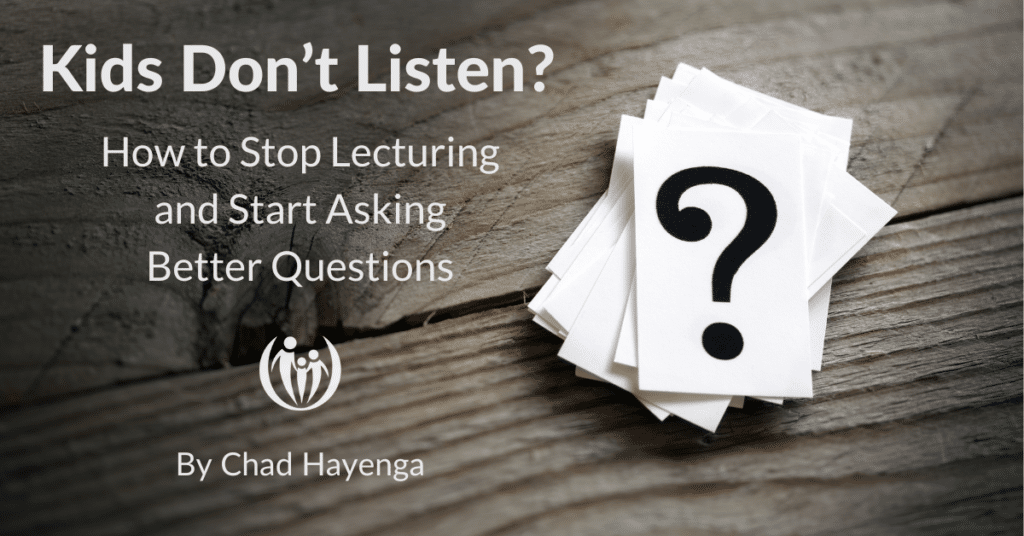
Kids Don’t Listen? How to Stop Lecturing and Start Asking Better Questions

Every parent has those moments when it feels like you’re chatting with the wind. You want to impart wisdom and decrease your child’s stress, but their glazed eyes seem to repeat your fear: “My kids don’t listen to me.”
As a parent coach and family therapist, I can confidently share that one of the very best tools for building wisdom (and actually getting kids to stop and listen!) is to ask questions.
Something happens when you learn how to ask better questions (and listen curiously to the answers). You spend less time lecturing and nagging, and your kids begin growing in wisdom. They become better listeners because you’re telling them less. As you thoughtfully listen to their answers, you’re modeling listening skills, so they have a good example to imitate.
Often, a simple, well-timed question can help our kids grow and learn much better than a long-winded lecture.
Why better questions are the perfect way to help kids who don’t listen
Consider the following benefits of questions:
Questions help keep parents out of “lecture mode”
Lectures tend to be a form of blowing off steam for parents. Especially if we tend to give the same ones over and over. Lectures rarely communicate any new information and do little to help our kids grow in wisdom. If we think back to our own childhood, most of us will not be able to recall a lecture we received from our parents, guardians, or teachers that genuinely helped turn on the light bulb. Most lectures tend to “exasperate” our kids, not train them up in wisdom.
Moreover, when kids know what you’re about to say, they are not motivated to listen. If you feel like your kids don’t listen to you, check yourself. Have you gotten into the habit of harping on the same problems again and again? Try asking questions of your kids instead.
Occasionally, I’ll ask my kids, “Do you know the basic points of what I would say in a lecture about this? If so, why don’t you tell me the 3 points, and we can spare the lecture.” Believe me; they know what I’m going to say!
Questions invite kids to think rather than tune out
Kids can easily roll their eyes and turn their ears off when we head into one of those familiar lectures. But when we can calmly ask kids questions, it activates their brains and enlists them in thinking about what needs to be done and what they can do to make it happen.
Take, for example, a messy room. Most parents have encountered a scenario where they walk into a room and find a mess left at the hands of a child. At this point, there are a couple of options:
- Say in an exasperated tone, “I asked you to pick up your toys when you were done, and now there is a big mess. You know you are supposed to….” and on and on we go.
- You can choose some of these questions in a curious tone, “It looks like someone had a lot of fun in here! Which are your favorite toys? Do you remember what needs to happen after you are done playing? Where are the toys supposed to go? What will happen if the toys don’t get picked up before dinner? Do you want me to help you get started, or do you want to do it on your own?”
Or how about a scenario where a teen has misused technology? Again, there are a couple of options:
- Say in a shame-driven tone, “I can’t believe you went behind our backs and watched that garbage. You want to be given more freedom and privileges, but it’s never going to happen if you act like this. You know what they say, ‘Garbage in, garbage out.’ No wonder there is so much garbage coming out of you lately.”
- Say in a concerned but grace-filled tone, “Seems like you’re watching some things we agreed you wouldn’t watch, is that right? It’s tough sometimes, isn’t it? What’s your understanding of why we wouldn’t want you to watch this stuff? What do you think it does to our relationship and trust? How do you want to move forward from here?”
Questions help keep parents from jumping to conclusions
It’s easy for parents to see one child as the instigator and another as the poor victim. (Especially if we were the instigator or the poor victim in our family growing up!) When we ask questions, it helps each child feel respected and allows them to share their perspectives.
One mom recently reported that when an argument and hitting broke out while driving in the van, she calmly pulled the car over, turned around to face her kids, and said, “Sounds like you are having a rough time back there. Can you help me understand what’s going on?” There were the usual accusations, and it didn’t end quite how mom had hoped, but the impact was significant. Days later, the child that was the “usual suspect” said to mom, “You didn’t accuse me right away in the car the other day. That made me feel better.”
Questions invite you to model the listening you hope your kids will learn
Don’t ask questions to manipulate your kids into being better listeners. That won’t work. However, if you say your kids habitually don’t listen to you, consider it a symptom of a larger problem. Asking questions will help disarm some of the defensiveness that often prevents listening.
An equally important aspect is that asking questions gives you the opportunity to model the listening you want your children to learn. As you ask questions (without assuming you have the answer) and follow up with more questions, you’re becoming a better listener and showing an interest in their thoughts and feelings. Your kids will notice and imitate. You may soon notice them asking you (and each other) the same follow-up questions you use to help them.
You want to ask more questions; now what?
Start with noticing the frequency of telling vs. asking
A good place to begin is to start noticing the number of times you “tell” rather than “ask.” Pay attention over the next few days to the number of times you tell your kids something they probably already know.
Replace a frequent reminder or lecture with a question
Then, think about what question you could ask instead. Rather than saying, “Okay, it’s time to get ready for bed.” Say, “Hey, everyone! What do we usually do at 8:30? You’re right; you get ready for bed. What do you do first?”
But my kids still don’t listen to me!
Questions are a simple and powerful tool. Asked well, questions can open hearts. Did you know Jesus asked over 300 questions?
Consider the question, “What happened?” The lilt of a voice, the facial expression, the tone, and even the sincerity of the question can either bring connection or conflict. Just because there is a question mark following a sentence doesn’t mean it is a good question, does it? There is an art to asking good questions!
While it’s still wise to monitor the frequency of your questions (as opposed to your lectures and nagging), asking more questions alone might not be enough. Some questions won’t inspire your kids to listen to you because they’ll feel manipulated or judged.
There are several things to keep in mind when asking our kids questions. Here are a few to consider in the form of, yep, questions!
4 questions to ask yourself when asking questions of your kids
1. How’s my body language?
How I look when I ask a question says a lot! Is my body language imposing or inviting? Am I scowling with my hands on my hips? Do I have steely, accusatory eyes, or have I gotten down to my child’s level and given them an inviting smile? If you are daring, replay a recent interaction while you stand in front of a mirror. What do you look like? One mom started a video recording during bedtime (often a challenging time for the family) and captured herself in her typical form. After watching the video, she commented, “I wouldn’t respect me either if I were my kids.”
2. What’s my tone of voice?
My tone of voice says about as much as my actual words. Is there a trace (or more) of sarcasm? A hint of accusation? Do I sound condescending? OR, do my questions suggest that I want to hear what you have to say? If words and tone don’t match, it can confuse kids and cause a disconnect. It could be risky, but try asking your kids how they hear you when you talk to them. There may be some exaggeration, but you could be surprised by some of the insights you gain!
3. Do I already know the answer?
Answering a question asked by someone who already has the “right” answer in mind can be very frustrating and often belittling. Our kids don’t appreciate it, either. It takes some practice, but learning how to ask sincere questions — to be truly curious and light-hearted — is much more honoring to our kids.
Some examples:
- How do you think that went?
- What did you most appreciate about the evening?
- What are some ideas you have about that?
- What would you like to do differently next time?
- What are you most excited about? What is your worst fear?
4. If they say, “I don’t know,” how will I respond?
Many parents get frustrated when they begin asking questions because they get a bevy of I-don’t-knows as the response. This is normal! You can make your questions more specific or concrete if you get an “I don’t know” response.
Our kids often don’t know what to do with our questions, especially if we’ve habitually given lots of stern orders or critiques. Being asked good questions can be quite a shock. It can also be kind of uncomfortable. So give kids some space. Let them think about it. Ask if you can, and ask them again tomorrow after they’ve had some time to consider. Doing things differently means there will be some growing opportunities — for you and your kids.
What happens when you learn to ask better questions?
Teaching the art of asking good questions is a favorite goal in my daily work with parents. (So much that I helped create a course on asking questions.) Why? Because we’ve learned that lectures and answers often shut kids down, discourage the art of listening, and build walls between parents and their kids. On the other hand, good questions build wisdom, strengthen connection, and lead kids to take more responsibility for their lives. Good questions also encourage both parents and kids to be better listeners.
To illustrate this in real life, we’ve invited coaching clients Joel and Amy to write about their own parenting journey of learning to ask good questions with their two teenage sons.
“Well, have you ever asked him?”
I remember the feeling of cluelessness one day when my husband and I were sitting in a session with our parent coach, Chad.
We’d been learning from Connected Families’ resources about how to communicate to our two teenage sons that they were safe and loved. While we were growing and our hearts were changing, we still had many unsolved problems and felt stuck. After we described an issue with one of our sons during a coaching session, Chad asked, “How does your son feel about it?” Dead silence. We were totally clueless. We said we thought he felt a certain way, but really we had no idea. Then Chad asked, “Well, have you ever asked him?”
And so our journey began in learning how to ask good questions.
Curious questions, not questions with an agenda
We’d been down the road of asking questions before. But it was a different route, where we asked questions to get our kids to answer how we wanted them to. Those questions were filled with a hidden demand and spoken in a tone of voice that matched our need to control the answer. “When are you going to do xyz?”, “Why are you doing that?”, “That didn’t go very well, did it?”
Asking our sons these condescending questions just led to eye rolls, huffs up the stairs, and door slams. Our battles for control over homework, chores, and other behavior left us stuck believing that our sons could not figure things out on their own, and we would tell them what or how to do almost anything. We loved them, but for us, the many parenting books and theories we sought left us more frustrated.
So there we sat, feeling a little lost and role-playing a problem situation in our session. Chad wanted us to see what asking good questions looked like, so I played our son, and Chad played the parent. As we started, I was ready to rumble. Bring it on, Chad! I was prepared to argue to win. But Chad (as the parent) wasn’t. And I felt it.
He was calm, compassionate, loving, and kind. He genuinely wanted to know what I was thinking and how to help me solve my problem. I was disarmed. And then, my tears began to roll. I realized how my responses have contributed to fights with our sons.
And then Chad gave my husband and me only ONE homework assignment: Ask our sons questions to seek understanding instead of telling them what to do. Yikes.
A bumpy road moving from telling to asking
We gave it a try and were surprised with what we found — I had never realized how many times I actually told my sons what to do! Even when they came to me with their problems for help, I would just automatically state my opinions — but now I started to catch those missed opportunities to ask questions.
My first attempts to ask good questions did not bode well! When my older son came to me with a problem, I stumbled out with, “Uh, well, do you want to know what I think?” Oh boy, as my two teenagers would say, my initial attempts were an “epic fail.” As I learned of my own deeper motives and desire to control their outcomes or responses, I realized I needed to let go.
My questions changed as I realized – I didn’t own their problem OR their outcomes. Letting go helped me become genuinely curious about what they felt and why. I wanted to connect with them, to understand them. One of my favorite series of questions is, “Can you help me understand what you are thinking?” and then, “Do you think that way will work better for you?”
Today: “There are fewer eye rolls, huffs, and door slams.”
We are still learning. But now, when I start to ask a question with a hint of “Let me tell you what I want you to do,” one of our sons will even point it out by saying, “Mom, don’t go there.” I will catch myself and start over with a different attitude. My sons are coming up with great ideas, and I enjoy watching them learn and grow through their successes AND failures. There are a lot fewer eye rolls, huffs, and door slams. We are learning and growing in a better way of being for each other rather than against each other and growing in becoming a connected family.
As you can see, Joel and Amy were able to turn the boat around in their relationship with their sons by learning to ask questions instead of just telling them all the time. It wasn’t easy — Amy initially didn’t have insightful questions magically pop into her head. But through their hard work and commitment, Joel and Amy learned to ask more and better questions and help their sons grow in wisdom.
Recap: How to start asking better questions and create a culture of listening
Let’s summarize. When you are ready to take action, I suggest shifting from a failed lecturing and ignoring system to a listening culture. You can do this with better questions.
1. Observe how often you tell your child what to do when you could ask a question instead.
2. Notice a “problem” time when you are most likely to tell and instruct instead of ask and inquire (getting out the door, going to bed, finishing homework, etc.).
3. Brainstorm some curious, open-ended questions you could ask next time instead.
4. Try them out. Remember to ask yourself…
- How’s my body language?
- What’s my tone of voice?
- Do I already know the answer?
- If they say, “I don’t know,” how will I respond?
5. Celebrate successes! Look for any time you ask questions when you could have lectured or when your kids listen to you when they could have ignored you. Celebrate your movement toward more relaxed curiosity and better listening as a family!
A prayer for the parent struggling with kids who don’t listen
Dear God,
Thank you for the opportunity to grow in my ability to parent my child(ren). Would you give me the patience I need to see the bigger picture with myself and my child(ren)? I know my lectures are not received well and often build up resentment toward me. They are often an effort to control when I feel out of control. Help me guide my family wisely with questions just as you, Jesus, so often teach, encourage, and correct with questions. Thank you for walking beside me in the journey of parenting. In the name of Jesus, Amen!




